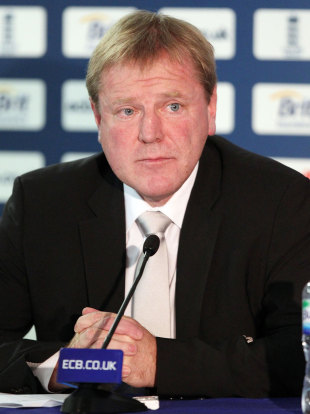|
England Rugby
The recipe for success
ESPNscrum Staff
January 12, 2012

Hugh Morris, the managing director of England cricket, has been invited to speak to England's Six Nations squad
© Getty Images
Enlarge
Stuart Lancaster has caused quite a stir since taking charge of England and has made no secret of his desire to learn from other sporting success stories as he attempts to lead England out of the darkness. A new-look squad and a temporary re-location to Leeds highlights a willingness, on his part and that of the Rugby Football Union, to shake things up while more than a passing interest in how their cricketing and cycling counterparts plotted a path to success underlines that commitment to look outside the box. Hugh Morris, managing director of England cricket, and Dave Brailsford, British Cycling's performance director, will address the squad in the coming weeks to offer an insight into their respective recipes for success having overcome their fair share of adversity. But what secrets will they reveal? Here our ESPN colleagues Andrew McGlashan and Dom Raynor recount how both sports conquered the world. What can English rugby learn from cricket? - ESPNcricinfo's Andrew McGlashan writes It shows how far English cricket has come, that three years ago they were going through the sort of upheaval that the Rugby Football Union currently finds itself in and are now No.1 in the world. The captain, Kevin Pietersen, and coach, Peter Moores, lost their jobs on the same day and England embarked on a tour of the Caribbean with stand-in men filling both roles. They lost the series, including being humbled for 51 in Jamaica, but the rebuilding soon started. The England set up was forced to take a pretty hard look at itself during those months. One of key factors was removing, or at least managing, the egos within the dressing room. It was always denied that there were any rifts or cliques, but there always will be within a sporting team. Managing those is key. Andrew Strauss and Andy Flower set about being an ethos where the team came first and each other's success was celebrated. Nobody expects all the players to be best friends away from the game and there are certain groups within the England team, for example the 'X-box' generation, but when they walk out into the middle there is only one aim. Flower, the team director, is a man who commands respect - none more so for his stance on Zimbabwe - and that has transcended into the England set-up. There is also a clear demarcation of responsibilities; the captain (whichever of the three it is ) is in control on the field, Flower takes charge of planning (both short and long term) the further behind the scenes Hugh Morris, the managing director of England cricket, provides a calm and authoritative presence. During the post rugby World Cup fall-out there appeared a fair degree of buck-passing - at least from the suits at the RFU - and no clear idea of where responsibilities lay. For a national sporting team to be a success everyone needs to work together. How can English rugby learn from cycling? - ESPN's Dom Raynor writes When Chris Boardman won Britain's first cycling medal for 72 years at the 1992 Olympics in Barcelona it was despite an amateurish GB set-up that was at a nadir. But by the Beijing Olympics in 2008, the British cycling team had been transformed into the best in the world by performance director Dave Brailsford, securing a record haul of 14 medals, eight of them gold. The seeds of the revival had been sewn at the 2000 Olympics in Sydney, when Jason Queally's gold in the one-kilometre time-trial was the pick of a four-medal haul for the team, but when Brailsford arrived in 2003, armed with a degree in sports science and psychology and four year's experience of competing as a professional cyclist in France, the revolution began in earnest. Brailsford implemented a strikingly simple, two-pronged approach. Firstly, he set about building a foundation for the future, identifying the best young athletes available via the Olympic Talent Team Programme and giving them access to the best equipment and coaches available. Crucially, GB cycling's relatively recent access to Lottery funding allowed Brailsford to recruit some of the top coaching talent around, although it's important to note, money alone did not bring success. Team GB's most promising 14 to 16-year-olds progressed through a structured system, firstly to the Olympic Development and Olympic Academy Programmes and, ultimately, to the Olympic Podium Programme. All the while being mentored by Brailsford, who also introduced cutting-edge training schedules, specific nutritional diets and psychological programmes to help empower the cyclists. Brailsford's second target was his now infamous "aggregation of marginal gains", an approach that seeks to add up every possible tiny increase in performance, technical kit, mechanics, aerodynamics etc. into a cumulative benefit that can prove to be the difference between winning and losing. It was an approach that bore almost instant success when Chris Hoy and Bradley Wiggins both won gold medals at Athens in 2004. While many teams have attempted to copy this approach GB cycling continues to lead the way under Brailsford, who himself adds a unique ingredient. Despite the best efforts of his opponents Team GB still dominated the Beijing Olympics and that's all down to the vision, drive and ingenuity of the son of an Alpine mountain guide. © ESPN Sports Media Ltd.
|
Live Sports
Communication error please reload the page.
-
Football
-
Cricket
-
Rugby
-
- Days
- Hrs
- Mins
- Secs
F1 - Abu Dhabi GP
Abu Dhabi Grand Prix December 11-131. Max Verstappen ()
2. Valtteri Bottas (Mercedes)
3. Lewis Hamilton (Mercedes)
4. Alexander Albon ()
5. Lando Norris ()
6. Carlos Sainz Jr ()
-
ESPNOtherLive >>
Darts - Premier League
Golf - Houston Open
Snooker - China Open
Tennis - Miami Open

